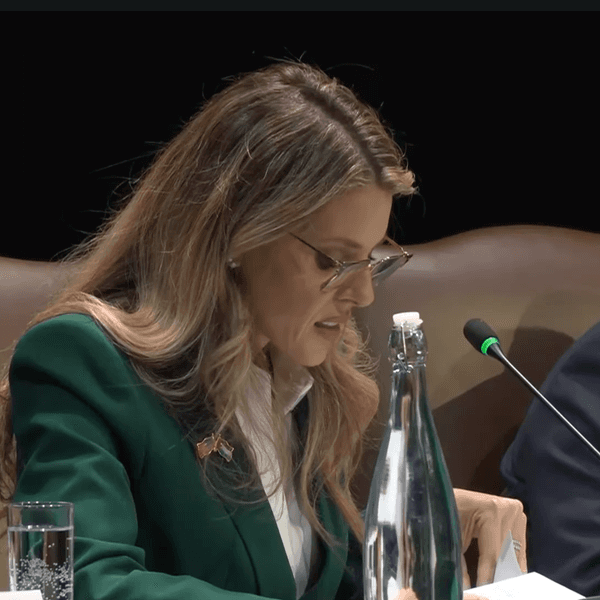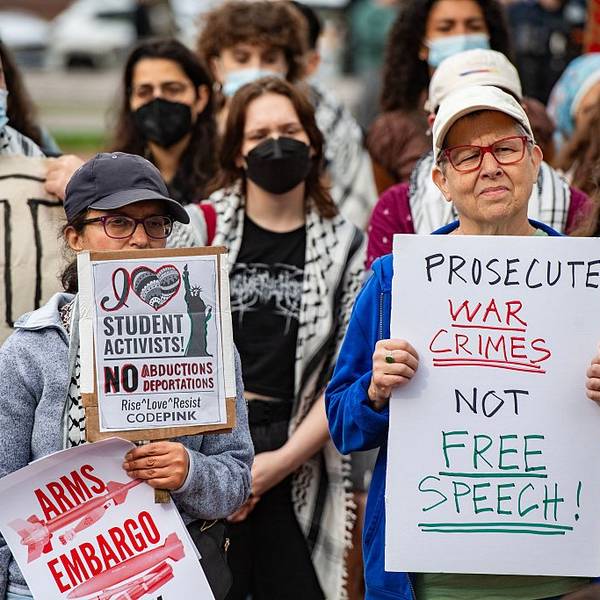Among the many responses I've received for my columns on the Middle East two stand out. A number of non-Jews, in person and by e-mail, have told me, "You write what I believe, but I'm afraid to speak out. I'm afraid to criticize Israel because people will think that I'm anti-Semitic."
A second response, spoken by an acquaintance whom I respect for his decent, liberal values, was more unsettling. "I'm starting to feel anti-Semitic," he said without any suggestion of irony. "It is disgusting what Israel is doing to the Palestinians."
"Anti-Semitism is not the issue," I replied. "It's not Jews attacking Palestinians, it's Israelis. Many Jewish people, myself included, share your disgust."
But maybe anti-Semitism is an issue, a subtext of the Palestinian-Israeli conflict that no one wants to talk openly about. In the cauldron of the times, anti-Semitism has become an accusation, a weapon, a way of silencing critics of Israel without having to listen to their arguments. And when used against Palestinians, it's a way of denying their aspirations and ignoring their grievances.
Anti-Semitism exists, but to extract its meaning it has to be put into perspective. Under Hitler, the German people murdered millions of European Jews. But today most Germans are friends and allies of Jews and of Israel. As a Jew, I still feel a gut wariness whenever I meet a German. But I also feel elated. That we two, German and Jew, can interact empathetically fills me with hope. The history of modern Germany is proof that people can change, that ancient feuds and tribal bloodbaths need not dictate humanity's future. Blacks-whites, Hutus-Tutsis, Bosnians-Serbs, even Arabs and Jews: we shall overcome.
Anti-Semitism exists in the Arab world. Increasingly, Arabs couch their opposition to Israel in the anti-Semitic rhetoric that originated in Europe. But is anti-Semitism driving the Palestinian resistance? Or is the Middle East conflict simply a battle over land, two peoples with a historic claim over the same territory? For centuries Jews lived amongst the Arabs of the Middle East. Coexistence was never easy and during World War II many Arab leaders gave verbal support to the Nazis. But Zionism, the movement for a Jewish state in Palestine, was a European phenomenon; Middle Eastern Jews did not look to the biblical holy land for security and life's meaning. After the holocaust the logic of Zionism could not be denied. European guilt assured Israeli statehood. But it was the Palestinians who bore the brunt. And they were not consulted.
Supporters of Israeli policy in Israel and America, rarely acknowledge this. They speak of the conflict with the Palestinians in terms of Arab anti-Semitism, and in the context of the holocaust and Jewish survival. Rarely mentioned is the historic record of Israeli provocations: the occupation of the West Bank, the military checkpoints, the continuous expansion of Jewish settlements in Palestinian territory.
Anti-Semitism in America, except on the margins of society, rarely includes overt acts of violence and discrimination. It is usually more subtle, expressed politically in the belief that the United States is a Christian nation or, among evangelical and some other fundamentalist Christians, that Jews cannot find salvation unless they accept Christian dogma. People have an absolute right to religious belief, but once it enters the political arena, it opens itself to critical comment.
On April 15, an Israeli Solidarity Rally brought speakers from all across the political spectrum. One speaker was Janet Parshall, a national talk show host who is a director of the evangelical Christian National Religious Broadcasters and the spokesperson for the Family Research Council, an anti-choice, homophobic front-group for right-wing Republicans whose web site <www.fcr.org> promotes tax cuts, bashes liberals, and says nothing about Israel. But at the Solidarity Rally, Ms. Parshall enthusiastically identified herself with what she considered the cause of the Jews and drew cheers attacking the idea of "land for peace." "We will never give up the Golan," she announced. "We will never divide Jerusalem," she declared.
Jewish organizations that uncritically support Ariel Sharon in the name of security for Israel are avidly courting the Christian right. A headline speaker at a recent meeting of AIPAC (the influential American-Israeli Political Action Committee) was Republican House Whip Tom DeLay who drew applause for calling the West Bank by its biblical name, "Judea and Samaria," and for stating that Israel should not give any land back to the Palestinians. Delay's politics are anathema to most American Jews, but all that can be overlooked, or so it seems, for his support of Israel. On his web site <www.tomdelay.house.gov>, Delay boasts of his 100% support for the positions of New American Magazine, the house organ of the John Birch Society. He has also publicly said, according to USA Today, that Christianity offers the "only viable, reasonable, definitive answer" to the questions of life. Note the word "only." No other religions are in the game.
What then is one to conclude about this new Jewish compact with the most reactionary elements of American society? It seems to me that right-wing Christians are happy to support a new crusade to drive Arabs from the Holy Land, and that they'll cheer the killing of Palestinians down to the last Jew. But don't expect Jewish warriors to be granted salvation. As the fundamentalist Christians describe it, heaven is off-limits to Jews; unless, of course, we Jews convert to their right-wing theology and denounce the religious legitimacy of our own Jewish faith.
In the context of American politics and religious culture, the Jewish organizations that demand uncritical support of Ariel Sharon have embraced organizations most closely reflective of anti-Semitism itself. For the sake of solidarity with Israel they've allied themselves with religious organizations most problematic for Jews. Supporting Sharon is bad enough. An alliance with the religious right is a second mistake.



